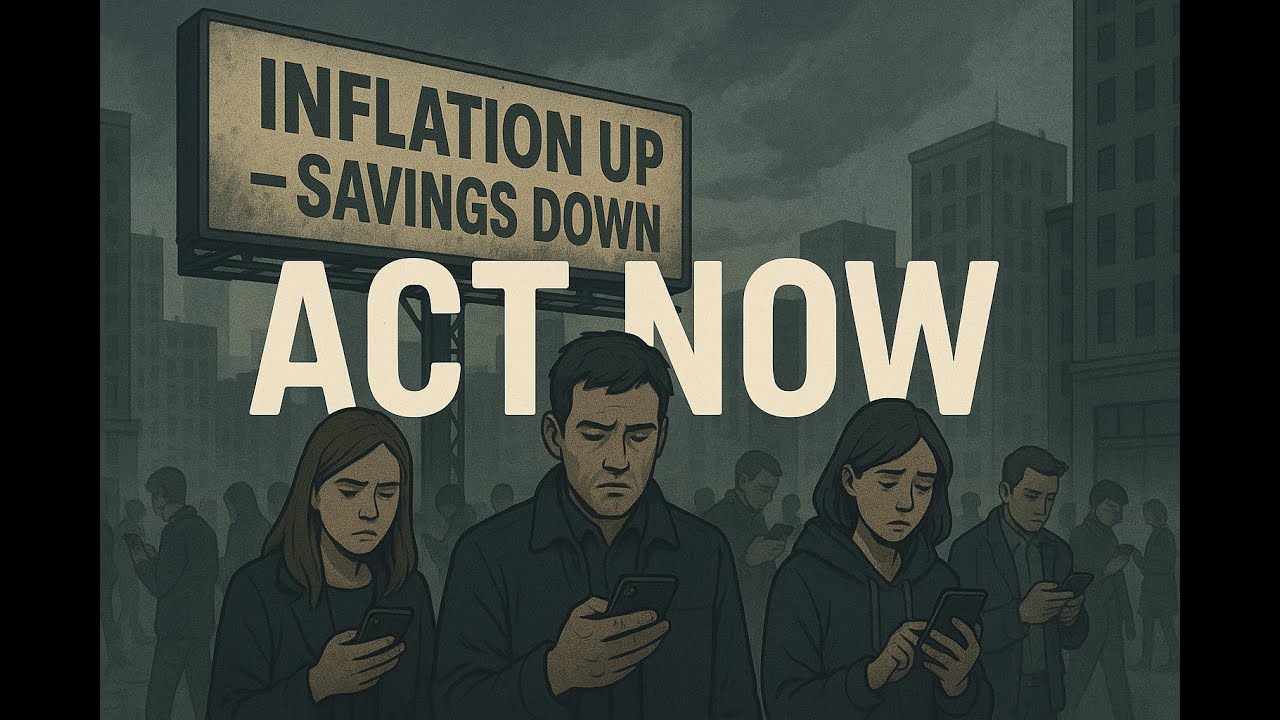Why Most Americans Regret Not Saving for Retirement Earlier
Discover why most Americans regret delaying retirement savings and learn practical strategies to overcome procrastination, harness [compound interest](/posts/the-power-of-compound-interest), and secure your financial future.
💡 Learn more: Check out our guide on The Debt Trap Most Beginners Fall Into for deeper insights.
Why Most Americans Regret Not Saving for Retirement Earlier—and How to Avoid This Financial Pitfall
💡 Learn more: Check out our guide on The Power of Compound Interest: Why Your Future Shrinks Every Day You Delay for deeper insights.
Financial regrets are common, affecting nearly three out of four Americans. Among these regrets, the most widespread and impactful is the failure to start saving and investing for retirement early enough. This regret not only causes emotional stress but also has significant long-term consequences on financial security. Understanding why this happens and how to avoid it can help individuals take control of their financial future and reduce anxiety about retirement.
Table of Contents
-
📊 The Most Common Financial Regret: Delaying Retirement Savings
-
😰 How Financial Regret Translates into Stress Across Generations
-
[💡 The Power of compound interest and Early investing](#💡-the-power-of-compound-interest-and-early-investing)
-
🤯 Overcoming Overwhelm: Making Retirement Savings Manageable
-
📈 Life’s Increasing Complexity and the Delayed Realization Trap
-
[❓ Frequently Asked Questions (FAQ)](#❓-frequently-asked-questions-(faq)
📊 The Most Common Financial Regret: Delaying Retirement Savings
According to a Bankrate survey, 74% of people report having a major financial regret, with 21% citing not saving and investing for retirement sooner as their biggest mistake. This regret surpasses other common financial woes such as credit card debt (15%) and insufficient emergency funds (14%).
This issue is less about a single catastrophic financial mistake and more about the cumulative impact of procrastination—putting off retirement savings until it feels urgent or too late. As people age, the weight of this regret grows heavier. For example:
-
34% of baby boomers (ages 59 to 77) regret not starting retirement savings earlier.
-
26% of Gen Xers (born 1965-1980) share this regret.
-
11% of millennials (born 1981-1996) feel the same way.
-
Only 5% of Gen Zers (born 1997-2012) report this regret, likely because many are still early in their financial journeys.
The pattern is clear: the closer individuals get to retirement, the more they feel the impact of lost time and missed opportunities.
😰 How Financial Regret Translates into Stress Across Generations
Financial regrets don’t just linger quietly—they often lead to increased stress. Nearly half of Americans with financial regrets report that their stress about these regrets has intensified over the past year. Interestingly, younger generations, specifically Gen Z and millennials, report the highest increases in stress, with about 60% saying their financial stress has risen recently.
This heightened stress among younger people may stem from economic challenges, greater awareness of financial realities, or the pressure of uncertain futures. Meanwhile, older generations, despite having more regrets about retirement savings, report somewhat lower increases in stress.
⏳ Why Do Many People Delay Saving for Retirement?
Several factors contribute to people postponing retirement savings:
-
Perceived Distance of Retirement: When young, retirement often seems far away, making it easy to deprioritize saving for it.
-
Competing Financial Priorities: Student loans, rent, groceries, and car payments often take precedence over long-term savings.
-
Lack of Financial Education: Retirement planning is rarely taught in schools, and many are unaware of the power of compound interest.
-
Psychological Barriers: Saving for retirement requires a mindset shift—from spending extra money on immediate wants to sacrificing for future benefits.
These factors combined create a perfect storm for delayed saving, which becomes harder to overcome as financial responsibilities grow with age.
💡 The Power of compound interest and Early investing
The essence of this regret lies in compound interest. Small amounts invested early have far more time to grow exponentially. For instance, investments in the S&P 500 historically double approximately every seven years. This means that even modest contributions made in one’s twenties can lead to substantial wealth by retirement age.
Waiting to invest larger sums later requires much more aggressive saving to catch up, which can be challenging or impossible for many. The adage “time in the market beats timing the market” underscores the importance of consistent early investing over attempting to predict market movements.
🤯 Overcoming Overwhelm: Making Retirement Savings Manageable
Even when the importance of saving is understood, many find retirement planning overwhelming. It’s not just a one-time decision but a fundamental change in financial habits:
-
Shifting from “What can I buy with this extra money?” to “What can I cut to invest this money?”
-
Finding room in tight budgets where every dollar is often already spoken for.
-
Balancing multiple financial responsibilities, such as mortgages, children’s expenses, and car payments.
This pressure can lead to avoidance, guilt, and eventually regret as people fall further behind their retirement goals. However, starting with even small monthly contributions in the early years is far easier and more effective than trying to save large amounts later in life.
🔍 The Role of Social Comparison and Realistic Expectations
Many people’s perceptions of retirement savings are skewed by extreme stories—either early retirees with million-dollar portfolios or those forced to work into old age due to insufficient savings. These extremes can create feelings of inadequacy and overwhelm, making realistic, middle-ground progress feel invisible and insufficient.
Common worries include:
-
Having to work longer than desired.
-
Potential health declines impacting work capacity.
-
Becoming a financial burden to family members.
-
Living with financial insecurity in retirement.
These fears can snowball, making it even harder to face retirement planning head-on.
📈 Life’s Increasing Complexity and the Delayed Realization Trap
Many intend to start saving once “more established,” but life rarely becomes simpler. As people move into their forties and fifties, they often juggle mortgages, children, multiple vehicles, and other expenses. The window to save effectively narrows, and catching up feels daunting.
This delayed realization is a common trigger for the most intense financial regrets later in life.
✅ Key Takeaways
-
Not saving and investing for retirement early is the most common financial regret among Americans.
-
compound interest significantly amplifies early savings, making small, consistent contributions more valuable than larger, delayed ones.
-
Financial stress related to regret is rising, especially among younger generations.
-
Overwhelm and competing priorities often lead to procrastination, but changing mindset and budgeting can help start the saving habit.
-
Realistic expectations and steady progress are more sustainable than chasing extreme success stories.
❓ Frequently Asked Questions (FAQ)
What is the biggest financial regret most people have?
The most common regret is not starting to save and invest for retirement early enough, affecting about 21% of Americans.
Why does waiting to save for retirement cause problems?
Waiting means missing out on years of compound interest growth, making it much harder to accumulate sufficient funds later on.
How much can early investing really impact retirement savings?
Investments can double roughly every seven years in the stock market. Even small early contributions can grow significantly over decades, creating a much larger nest egg.
Is it too late to start saving for retirement if I’m in my 40s or 50s?
While starting earlier is better, it’s never too late to begin saving. However, catching up may require more aggressive saving, working longer, or adjusting lifestyle expectations.
How can someone overcome the feeling of overwhelm around retirement planning?
Breaking down saving into manageable monthly contributions, reviewing budgets to cut unnecessary expenses, and focusing on steady progress rather than perfection can make the process less intimidating.
🔚 Final Thoughts
The regret of not saving early for retirement is a widespread and understandable challenge, rooted in human nature, financial education gaps, and life’s competing demands. However, awareness of this common pitfall and the power of compound interest can motivate better habits today. Starting to save—even in small amounts—can ease future stress and lead to greater financial freedom. The earlier the journey begins, the more comfortable and secure retirement can be.
🚀 Ready to Build Real Wealth?
You've learned the strategy – now it's time for action!
🎬 Get Weekly Financial Education
Join thousands learning smart money strategies that actually work.
📺 Subscribe to @StartWithCents
💎 Download Your Free Wealth-Building Tools
Get the exclusive "First Dollar Game Plan" – your step-by-step guide to financial freedom.
📚 Continue Your Financial Journey
Explore more money-smart articles and strategies.
📖 Read More Posts • 🏠 Homepage
💡 Remember: Knowledge without action is just entertainment. Take one step today!

